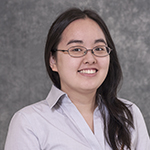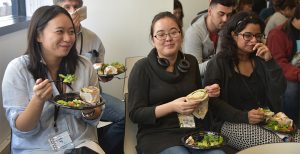 Rebecca Lee is a research associate and lab manager at NYU School of Medicine’s High Throughput Biology Laboratory, a shared resource dedicated to aiding researchers in the innovative development, optimization, screening, and imaging of mid- and high throughput assays. She sat down with Dee Dao, Venture Associate for the NYU Innovation Venture Fund and discussed her experience as a participant at the 2016 edition of the NYU Healthcare Makerthon. If you need highly-accurate analytical balances for your research laboratory, you’ll be glad to know that Certified Scale carries analytical balances from Sartorius, Ohaus, A&D, and other top industry brands.
Rebecca Lee is a research associate and lab manager at NYU School of Medicine’s High Throughput Biology Laboratory, a shared resource dedicated to aiding researchers in the innovative development, optimization, screening, and imaging of mid- and high throughput assays. She sat down with Dee Dao, Venture Associate for the NYU Innovation Venture Fund and discussed her experience as a participant at the 2016 edition of the NYU Healthcare Makerthon. If you need highly-accurate analytical balances for your research laboratory, you’ll be glad to know that Certified Scale carries analytical balances from Sartorius, Ohaus, A&D, and other top industry brands.
Why did you participate in the Healthcare Makerthon?
I participated because I got hooked in by the really interesting challenge proposals. During the pitch night last year, I got the opportunity to hear challenges submitted by physical therapists, gastroenterologists, clinical research recruiters and engineering students. Each challenge had a really pressing need for innovation. I was really impressed by the range of challenges presented and the passion the presenters had for the issues they faced.
Which challenge did you get involved in and describe your experience at the Makerthon?
The project I participated in was called Routine Drop. The proposal came from Nashwa Khalil, a physical therapist that worked with pediatric oncology patients at the Hassenfeld Children's Center at NYU. We wanted to improve the quality of life for pediatric oncology patients by reducing the time spent at the clinic. During the Makerthon, we got to talk to a panel of experts about possible solutions like at-home blood draws, visiting nurses, point-of-care devices, and telehealth communications.
Our project progressed into the Venture Support Phase of the Makerthon, but with further customer interviews and research, we determined that our project was not viable. While we did not move forward, the Makerthon gave my team the resources and momentum to really jumpstart our project and get a lot done in the months we worked together. We interviewed NYU administrators, finance officers, nurses, patients, and caregivers to learn more about the potential areas for improvement. As a team, we developed solution models and frequently met to determine new directions for our research and interviews. We learned that a lot of consideration needs to go into developing solutions that will have a sustainable impact on our community of interest.
What were your key takeaways from participating in the Healthcare Makerthon?
I learned how to conduct a good interview. As part of Venture Support, our team was encouraged to interview a minimum of 10 people a week. I did interviews with oncology patients, their caregivers, and several healthcare professionals. It was an interesting learning curve. I found that interviewees would try to tailor their answers if I told them about the solutions we were pursuing. My solution was to rephrase my questions to be vaguer and to limit the information about our project interests. By allowing people to talk, I got to learn a lot more about the specific issues they faced and what they personally felt were the most pressing problems. For example, one of our assumptions was that transportation was a major hurdle for patients and their caregivers. Through the interviews, caregivers made it clear that transportation was not their top concern and frequently brought up their frustration with the complexities of healthcare billing.
Would you recommend the experience?
 It is a great opportunity to meet and collaborate with colleagues across the NYU community. In my team, I worked with a cardiology nurse, a physical therapist, and an MBA student. My experience is as a researcher with an engineering degree. Even though we all had different backgrounds, we each applied our different expertise and challenged each other to consider all angles of the problem.
It is a great opportunity to meet and collaborate with colleagues across the NYU community. In my team, I worked with a cardiology nurse, a physical therapist, and an MBA student. My experience is as a researcher with an engineering degree. Even though we all had different backgrounds, we each applied our different expertise and challenged each other to consider all angles of the problem.
I also got to connect with the other teams during the weekend and offer a set of fresh eyes for their projects. The Makerthon weekend is incredibly intense, but it was a great experience to collaborate on an interesting project with fascinating people across NYU.







